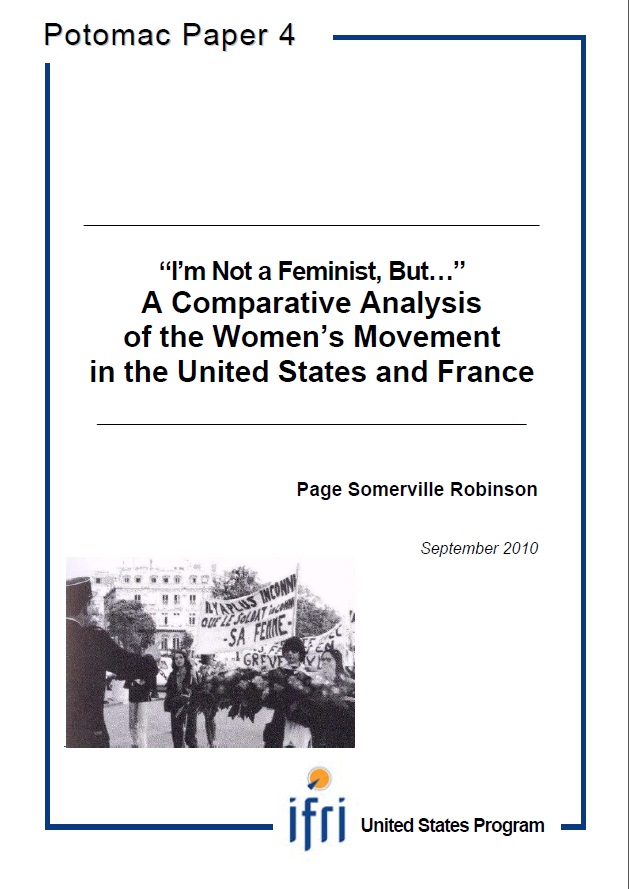‘‘I'm Not a Feminist, But…'', a Comparative Analysis of the Women's Movement in the United States and France

The emergence of a feminist thought in the 18th century gave rise to steady and regular exchanges between French philosophers and American activists. They illustrate in a very particular sector the wealth of the relation between both countries. This dialogue continues on renewed bases today: both in universities (with the exploration of the concept of gender) and in the militant world (with the defense of precise and limited causes).
From the pre-revolutionary era, French and American feminists have engaged in a nearly constant exchange of correspondence and theory. French and American feminist movements thus converged on a number of issues, such as education, divorce and inheritance rights, the fight for suffrage, and reproductive rights.
By the early 1980s, however, a rift developed between French and American feminists caused by misleading academic analyses and misrepresentations in media coverage. American feminists became widely associated in French intellectual circles with manhating radicalism. Conversely, American circles began to correlate French feminism with a primarily differentialist intellectual movement lacking an activist arm. These limited understandings led many to discount the richness and diversity of feminist movements in France and the United States.
This falling-out is not representative of current evolutions however. On the one hand, academic studies on feminism have found a new dynamic in the emergence of Gender Studies; on the other hand, feminist activism remains very much alive, organizing around a number of issues such as equality in the workplace, rights for immigrant women, and stopping violence against women.
Gender Studies are now exploring a number of remaining deep-seated issues, such as whether or not there are essential differences between men and women, and if so, how they are made manifest. Activists also contend with a longstanding tension between social movements and the feminist struggle – as feminists may also be involved in labor movements, for example, how should they prioritize their efforts? Last but not least, with many young women refusing to be called feminists, yet supporting feminist causes, the notion itself may need to be overhauled.
A French-American dialogue on these issues has started afresh. The advent of new media provides a backdrop against which feminists may represent themselves and renew important debates far from misrepresentations.

Also available in:
Regions and themes
ISBN / ISSN
Share
Download the full analysis
This page contains only a summary of our work. If you would like to have access to all the information from our research on the subject, you can download the full version in PDF format.
‘‘I'm Not a Feminist, But…'', a Comparative Analysis of the Women's Movement in the United States and France
Related centers and programs
Discover our other research centers and programsFind out more
Discover all our analysesAUKUS Rocks the Boat in the Indo-Pacific, And It’s Not Good News
For anyone who still harbored doubts, Washington made crystal clear from the announcement of the new trilateral alliance with Australia and the UK (AUKUS) that countering China is its number one priority, and that it will do whatever it takes to succeed. Much has been said about the consequences of AUKUS on the French-US relations, but the strategic implications for the Indo-Pacific nations (including France), and for China especially, are also critical to consider.
Washington-Téhéran : l'élection de Joe Biden change-t-elle la donne ?
The recent assassination of Mohsen Fakhrizadeh, the father of Iran's nuclear program, echoes that of Qassem Soleimani in January 2020 and illustrates the policy of "maximum pressure" which has prevailed these past four years. In this context, Joe Biden's election gives rise to high expectations for the appeasement of U.S.-Iran relations.
L’inégalité du Collège électoral aux États-Unis : comment réparer la démocratie américaine ?
Since the start of the 21st century, the flaws of the Electoral College, which completes the election process of the president of the United States by indirect universal suffrage, are the target of stronger than ever criticism.
Trade Wars: A French Perspective
The Section 232 tariffs on steel and aluminum announced by the United States in March would, if applied, have little direct impact on the French economy, but rather point toward a broader trend of protectionism and economic nationalism and a widening gap in transatlantic relations that is likely to have far-reaching implications for France.










